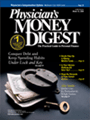Publication
Article
Physician's Money Digest
Identify Some Financial Warning Signs
Just as an automobile engine's warninglights come on when it needs service,personal finances are the sameway. According to the Institute of ConsumerFinancial Education, the only differenceis the financial danger signs manifestthemselves in a form other than a warninglight. Ignoring such warnings in the handlingof money can become very expensive.
Many physicians, however, aren't alwayshonest with themselves or familymembers about their own financial situation.Not wanting to exhibit their lack offinancial knowledge, they keep theirfinancial matters, good or bad, to themselves.Often, financial counselors talkwith clients who are way over their headsin debt, yet their clients genuinely thinkthat their credit practices are just fine,despite the growing debt.
Admit You Have a Problem
If you have a debt, credit, or otherfinancial problem, the first and mostimportant step is to admit to yourself thereis a problem and it is time to do somethingabout it, even if it means getting outsidehelp. This is also a difficult hurdle to clearfor most doctors because they think thatdoing so would be an admission of financialfailure. However, the real failure is innot getting help and digging yourselfdeeper and deeper into a financial hole.
Whether you think you have a problemor not, take a few moments to reflecton your current financial state by reviewingthe following seven financial warningsigns. If any of them are close to home,you may want to consider contacting anaccredited, nonprofit credit counselor foran appointment.
See the Warning Signs
1. You use your credit cards regularlyand rarely pay more than therequired minimum payment. Simple mathreveals this approach to be a one-way roadto disaster. Eventually, your debt willbecome so high that you may not even beable to make the minimum payment.
2. You are often or always late onregular monthly bills. If you findyourself receiving the new bill before payingoff the previous one on a regularbasis, then you simply don't have controlover your finances. These monthly billsshould represent your basic needs, so youshould be able to pay for them withoutany problem or delay.
3. You are in frequent argumentswith your spouse about money.This is usually a sure sign that you and theperson you're arguing with are overlystressed about mutual finances, and probablyfor good reason.
4. You purchase necessary consumableitems, like food and gas, witha credit card. A healthy attitude towardcredit is one in which you only use it inemergencies or to pay for importantitems, with the intention of paying themoff quickly, usually within 90 to 120 days.Otherwise, credit is simply a convenience;however, it comes at a very high price.
5. You have no idea what your totaldebt is. If you can't estimate within$500 or $1000 what your total debt is, yourspending is out of control. Chances are,when you receive your monthly statementsyou don't even look at the balance, andinstead just look to see what the minimumpayment is. That's not a good approach tousing and managing credit.
6. You have recently taken out a cashadvance on a credit card to pay amonthly bill. Typically, credit cards charge ahigher interest rate and allow no graceperiod on cash advances. They also chargea service fee, so it simply doesn't makefinancial sense to pay your bills like this ona regular basis. It is far better to have aspending plan in place.
7. You have paid overdraft fees onbounced checks at your bank andat the bank of the payee. Also take heedif you have had a checking account closedbecause of too many rubber checks.
If you see two or more of these financialwarning signs in your life, it is essential thatyou do something to turn your credit-basedspending practices around quickly.Otherwise, you may be facing collectionor legal actions by your creditors soonerthan you might think.
For more information on debt-related financialissues, contact the Institute of Consumer FinancialEducation, a consumer-oriented, nonprofitpublic education organization, at 619-239-1401 or www.icfe.info.
